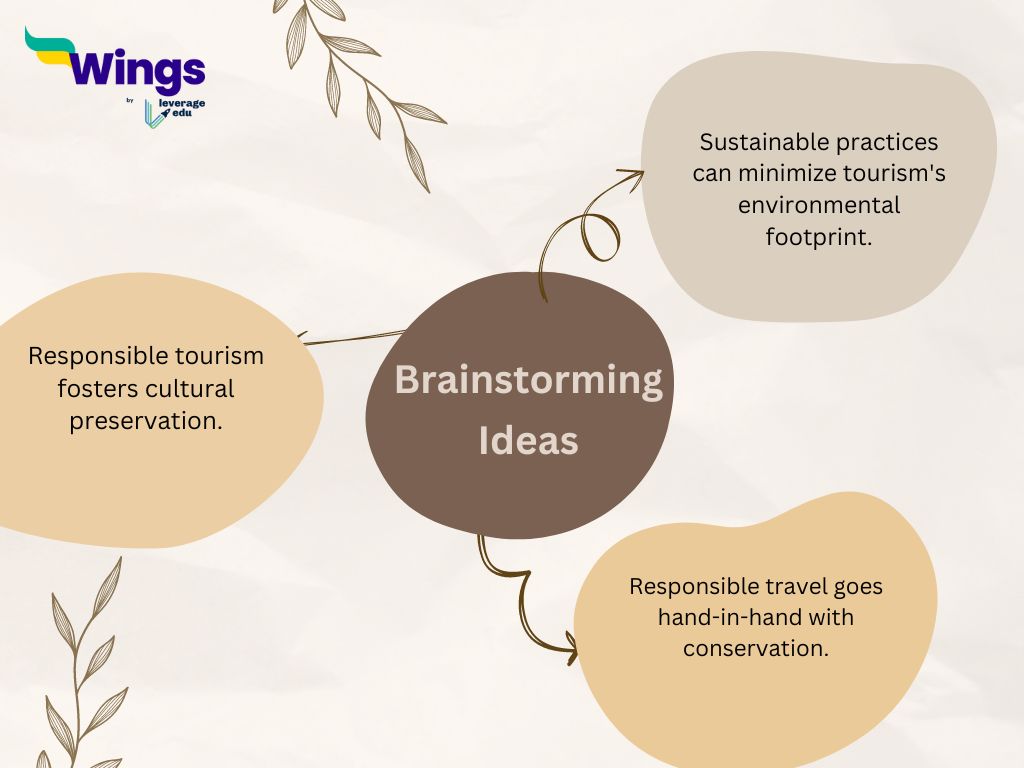Brainstorming Ideas
Refer to the following brainstorming ideas to get a better understanding of the answer.
Reasons for disagreement with the statement:
- Responsible tourists contribute significantly to the preservation of local cultures.
- The environmental impact of tourism can be easily mitigated through such practices.
- Responsible tourism often involves supporting conservation efforts.

Q. In recent years,” responsible tourists” have paid attention to preserving both the culture and environment of the places they visit. However, some people say that it is impossible to be a “responsible tourist”. To what extent do you agree or disagree?
Ans. In recent years, the concept of “responsible tourism” has gained considerable attraction, with many tourists making a conscious effort to preserve the culture and environment of the places they visit. Although some critics state that it is impossible to be a “responsible tourist,” I firmly disagree with this statement.
Firstly, responsible tourists contribute significantly to the preservation of local cultures. Respecting a particular place’s local customs, traditions and ways of life, tourists can help sustain cultural heritage. For instance, nowadays there are a lot of people who visit Japan and have started participating in traditional tea ceremonies without disrupting the sanctity of the ritual, contributing to cultural preservation. In addition to this, purchasing local handicrafts directly from artisans rather than mass-produced souvenirs supports the local economy.
Secondly, the environmental impact of tourism can be easily mitigated through such practices. Tourists can adopt eco-friendly behaviours such as reducing water and energy consumption and choosing sustainable modes of transportation. For example, in regions like the Galapagos Islands, tourists are encouraged to follow strict guidelines that include staying on designated paths, not disturbing wildlife, and participating in organized eco-tours.
Lastly, responsible tourism often involves supporting conservation efforts. Many tourists now choose to engage in activities that directly benefit the environment, such as participating in beach clean-ups or contributing to reforestation projects. The success of the Great Barrier Reef conservation initiatives, supported by tourists who volunteer and donate, exemplifies how responsible tourism can lead to significant positive outcomes.
In conclusion, while it may be challenging to completely eliminate all negative impacts of tourism, it is certainly possible to be a responsible tourist. By respecting local cultures, adopting eco-friendly practices, and actively participating in conservation efforts, tourists can play a pivotal role in preserving the environments and cultures they seek to experience.
Analysis
Paraphrased Statement: In recent years, the concept of “responsible tourism” has gained considerable attraction, with many tourists making a conscious effort to preserve the culture and environment of the places they visit.
Thesis Statement: Although some critics state that it is impossible to be a “responsible tourist,” I firmly disagree with this statement.
Body Paragraph 1-Topic Sentences: Firstly, responsible tourists contribute significantly to the preservation of local cultures. Respecting a particular place’s local customs, traditions and ways of life, tourists can help sustain cultural heritage.
Body Paragraph 1- Supporting Reasons and Explanations: For instance, nowadays there are a lot of people who visit Japan and have started participating in traditional tea ceremonies without disrupting the sanctity of the ritual, contributing to cultural preservation. In addition to this, purchasing local handicrafts directly from artisans rather than mass-produced souvenirs supports the local economy.
Body Paragraph 2- Topic sentence: Secondly, the environmental impact of tourism can be easily mitigated through such practices.
Body paragraph 2- Supporting Reasons and Explanations: Tourists can adopt eco-friendly behaviours such as reducing water and energy consumption and choosing sustainable modes of transportation. For example, in regions like the Galapagos Islands, tourists are encouraged to follow strict guidelines that include staying on designated paths, not disturbing wildlife, and participating in organized eco-tours.
Body Paragraph 3- Topic sentence: Lastly, responsible tourism often involves supporting conservation efforts.
Body paragraph 3- Supporting Reasons and Explanations: Many tourists now choose to engage in activities that directly benefit the environment, such as participating in beach clean-ups or contributing to reforestation projects. The success of the Great Barrier Reef conservation initiatives, supported by tourists who volunteer and donate, exemplifies how responsible tourism can lead to significant positive outcomes.
Conclusion: In conclusion, while it may be challenging to completely eliminate all negative impacts of tourism, it is certainly possible to be a responsible tourist. By respecting local cultures, adopting eco-friendly practices, and actively participating in conservation efforts, tourists can play a pivotal role in preserving the environments and cultures they seek to experience.
Vocabulary in Use
| Word | Meanings |
| Considerable Attraction | A significant appeal that draws interest. |
| Conscious Effort | A deliberate attempt to achieve something. |
| Sustain | To maintain or keep something ongoing. |
| Disrupting | Causing an interruption or disturbance. |
| Sanctity | The state of being sacred or holy. |
| Souvenirs | Keepsakes from a place or event. |
| Designated Paths | Officially assigned routes. |
| Exemplifies | Serves as a typical example. |
| Pivotal | Crucially important. |
Linkers and Connectors Used
Following are the linkers and connectors used:
- Firstly
- For instance
- In addition
- Secondly
- For example
- Lastly
- In conclusion
Are you preparing for IELTS? Check out this video to improve your writing skills for the IELTS exam given below👇.
Download the Leverage IELTS App today.


Need help preparing for IELTS? Check out the best IELTS preparation courses in the market offered in a live training environment.


 One app for all your study abroad needs
One app for all your study abroad needs












 60,000+ students trusted us with their dreams. Take the first step today!
60,000+ students trusted us with their dreams. Take the first step today!